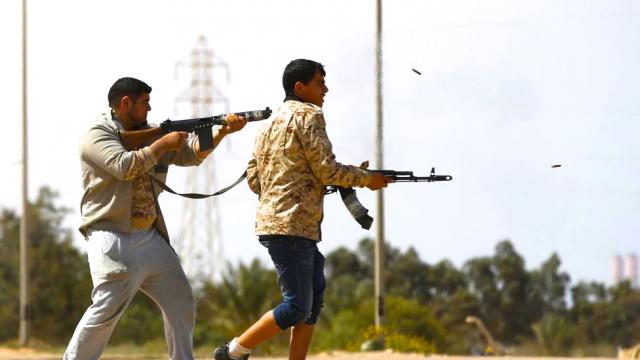
Libya’s recently established ISIS affiliate released a video last month showing their execution of 21 Egyptian Coptic Christians near the coastal city of Sirte. The massacre prompted immediate and justified condemnation from governments around the world. But missing from most of the coverage was the fact that Sirte was the hometown of deposed Libyan leader Muammar Qaddafi, and was practically destroyed by NATO air-strikes and a rebel offensive in the last days the 2011 Libyan intervention.
As we have already seen in places riven by factional fighting – like Somalia and Syria – small, radicalized groups are achieving a kind of prominence they never could under normal circumstances. Just ask the people of Fallujah in Iraq, the birthplace of ISIS.
The makers of last month's video showed equal parts ignorance and propaganda savvy in their claim to bring the battle to Rome. Ignorance in the sense that Coptic Christians owe no allegiance to Rome and have their own Pope in Alexandria; savvy in that it puts their struggle in the context of an eventual revenge attack on Italy, the country’s previous colonial master, as well as extending the narrative of a religious war.
The actions of ISIS drew retaliation from the Egyptian government whose air force quickly struck another city under the group's control, Derna, which is closer to the Libyan/Egyptian border. The Egyptian response resulted in the deaths of at least seven people, including a mother and three children.
But it's not just the Egyptians and other regional players who have made mistakes in their approach to the increasingly chaotic situation in Libya. In fact, a former NATO ally, Abdel Hakim Belhadj, is said to be leading the Islamic State faction within the country. Belhadj in his former capacity as an ally has met and been photographed with uber-U.S. hawk John McCain.
McCain, of course, already embarrassed himself by appearing with kidnappers in Syria while promoting the idea of arming “moderate” rebels in that country a few years ago. Still, it seems that none of these missteps will stop American news networks from bringing McCain on as an expert on foreign policy and terrorism in the Arab world.
NATO’s Triumph Was Libya’s Loss
By the late fall of 2011, many in the Western foreign policy establishment were touting the success of the “kinetic military intervention” in Libya. According to the experts, there was little doubt that soon after the intervention, the Libyan people would have their very own Thomas Jefferson and march towards a democratic government, with a (subservient) place in the global economy to follow.
The armchair generals were wrong, of course. And much like the neo-conservative rightwingers who supported the cause, the liberal interventionists with their “Right to Protect” (R2P) doctrine still haven't admitted their failures; rather, they continue to be invited on to the Sunday talk shows and to write op-eds in mainstream newspapers where they opine that NATO countries need to intervene in conflicts from Syria to Ukraine. Isn't it about time someone evaluated what actually happened in Libya?
Before the NATO bombing that led to Qaddafi’s ouster, Libya was the richest country per capita in Africa. It had an 88% literacy rate, free university for all citizens and universal healthcare. Girls had equal educational opportunities and women in the country also had “a degree of social and occupational promotion for women that women in many other Arab countries might well envy.”
The latter fact brings to the fore one of the strangest paradoxes of Western interventions in majority Muslim countries. From Afghanistan in the late 1970s – where women were gaining rights before the West unleashed reactionary Mujehedin forces in a proxy war against the Soviet Union – to Iraq more recently, Western powers have consistently intervened in Muslim countries with the declaration that they're doing it at least in part to secure women’s rights. Whatever rights women had before the intervention always seem to evaporate in the aftermath.
In Libya today, especially in the east, women are now mostly confined to their homes and, even covered, take a great risk if they go out un-escorted by a male relative. Such is the price of progress.
Qaddafi was obviously not an ideal leader. He was a ruthless and often brutal man who made the common mistake among dictators of basing the state on his own eccentric, some might say clownish, personality. However, he ruled a country that had been fabricated by colonial powers out of different, often antagonistic tribes and cultures, and kept it united for 42 years. That he was able to rein in those disparate groups shows that at least in the context of his own country, he was a successful political operator.
The Propaganda War
Qaddafi did nothing to help himself with his over-heated rhetoric in the lead-up to the NATO intervention – but the aftermath of the conflict proved that much of what he had said from the outset was true. His most dedicated opponents were Salafists, some of whom had fought in Afghanistan and pledged loyalty to al-Qaida, the group that NATO was ostensibly fighting in that country.
When NATO's bombardment of Libya began and “peaceful protesters” suddenly morphed into heavily armed militias, we were told the operation was intended to prevent a massacre as Qaddafi’s forces prepared to enter Benghazi, the country’s second largest city. Editorial pages from Washington to Paris to Cairo screamed that the dictator was planning a genocide that would rival or even surpass the one in Rwanda years before.
The fact that none of this was provable didn’t stop the likes of the un-elected French “philosopher” Bernard-Henri Levy, and appointed Democratic hawks like Samantha Power, from claiming that a mass slaughter was inevitable. In fact, all the evidence up to that point seemed to show the opposite. While the regime was certainly not kind to opponents in its march to Benghazi, there was little evidence to show that large-scale atrocities had followed from the regime’s victories against rebels in other cities and towns.
There were also reported cases of bombardments of neighborhoods in the capital, Tripoli, and of Benghazi, supposedly by Libya’s air force. These incidents were presented as proof that NATO needed to create a no-fly zone in the country. The stories, which originated on Al Jazeera – the news channel from Qatar, whose Emir had long opposed Qaddafi, and whose country was among the first to begin arming the rebels – were quickly picked up but not investigated by international media outlets. And there was one big problem with the stories: none of it was true.
Another fabrication promoted by Al Jazeera, then picked up by The New York TImes and other Western media sources, was even more troubling. It was said that Qaddafi was recruiting Sub-Saharan mercenaries to battle the rebels, although there was no visual confirmation of this. Libya has many black citizens, especially in the south of the country, and as many as a million guest workers were living there before the 2011 revolution.
The lack of evidence didn’t stop Martha Raddatz, reporting for ABC news, from claiming on Feb. 2, 2011, that “Gaddafi’s brutal side has emerged once again. This time flying in cargo planes full of African mercenaries, who don’t even speak the language, to do his dirty work. Trained killers gunning down residents and protesters in cold blood.”
The cynical use of mostly poor and marginalized people to demonize the regime made them easy targets for the rebels, who commenced with public lynchings and be-headings long before the emergence of ISIS, in Benghazi and other places – atrocities for which there is ample visual evidence.
After the war ended, The New York Times lamented the “racist overtones” in some of the rebel propaganda the paper had spent the previous months disseminating. The newspaper's about-face, and its inability to take responsibility for acting as a propaganda arm for NATO and the rebels, reminded many of the incidents of “proof” that New York Times reporter Judith Miller and others provided about Iraq’s WMD in the lead-up to that war nearly a decade earlier.
If lessons are to be learned from NATO's failed intervention in Libya – which, it can be argued, gave Syria's opposition the impetus to take up arms against Bashar Al-Asaad’s Ba’ath Party, in the expectation of a similar response from NATO – it’s that the public can no longer rely on the mainstream media or politicians to remember, much less to acknowledge, their recent mistakes. Now, as high-level discussions ensue about whether, and how, to embark on a new and expanded mission to battle ISIS, the famous cliche rings more true than ever: that "those who cannot remember the past are condemned to repeat it."
3 WAYS TO SHOW YOUR SUPPORT
- Log in to post comments












